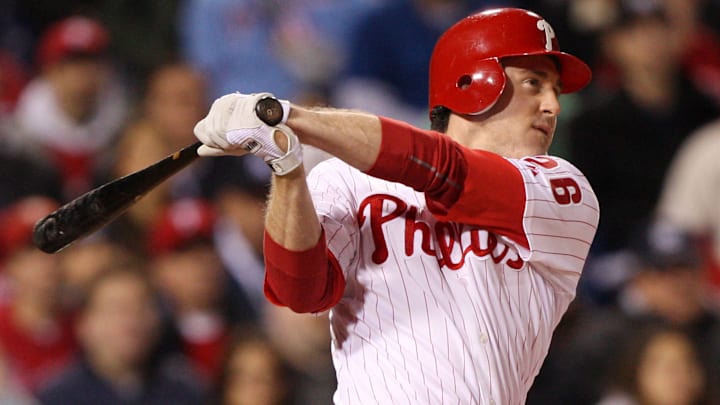Now that Chase Utley has been placed on the Hall of Fame ballot — joining his former double-play partner Jimmy Rollins — there will be much discussion regarding his chances of getting enshrined. The former Philadelphia Phillies' numbers are certainly impressive, but are his stats good enough to get him 75 percent of the votes?
There are currently 20 second basemen with plaques in Cooperstown. Utley has a case when compared to some of his already-enshrined peers. Voters typically look at a few factors when deciding which players should receive Hall of Fame consideration. They look at the player's prime years. How long was the peak? How did their stats compare to others at that time?
The voters also often look at a player's longevity. Players who had longer careers — and peaks within their careers — often have higher statistical numbers. Recently, voters have been voting based on character as well. Players who were associated with steroids or performance-enhancing drugs have often been left off of many ballots.
How does Utley stand up in these different areas?
In many cases, he may check off enough boxes for some voters. Others may not think he's worthy of going to Cooperstown on his first try. Yet others may believe he doesn't belong at all. Let's delve into Utley's chances of becoming engraved in baseball history one day.
Chase Utley's peak years
The Phillies' World Series Champion second baseman made his MLB debut in 2003. He played in 94 games in 2004 and became a full-time player the following season.
According to Todd Zolecki of MLB.com, from 2004-2014, Utley's 62.0 bWAR ranked third in all of baseball. The players in front of him in the category are Albert Pujols and Adrián Beltré — who is also in his first year on the ballot. Pujols will be a no-doubt first-ballot inductee, and Beltré also has a very good shot of getting inducted.
Over that same span, the Phillies' second baseman led all players at the position in WAR, was second in home runs and RBI, and third in slugging percentage. Utley was also selected to represent the Phillies in the All-Star Game six times, was a Silver Slugger each year from 2006-2009, and won a World Series ring.
The factor that could hurt Utley is that his peak wasn't as long as other player's peak years. Chronic knee pain slowed him down and ended his dominance earlier than expected. It stunted some of his stats that could have reached higher levels had he not endured injuries and missed time, and might negatively affect how some voters view him.
How Chase Utley compares to other HOF second basemen
Utley stacks up pretty well against other second basemen already in the Hall of Fame. Of the 20 already enshrined, his 62.4 bWAR is 14th among all second basemen in history. That number beats out 11 other players at his position already elected to Cooperstown. His bWAR is comparable to players like Ryne Sandberg, Roberto Alomar, and Craig Biggio. All of whom are Hall of Famers.
The six-time All-Star has a 49.3 WAR7 — the sum of his best seven seasons' WAR — and actually tops those aforementioned second basemen. His 49.3 score ranks ninth among all second basemen and is higher than the 44.4 average WAR7 of the 20 second basemen already in the Hall of Fame.
Utley's .823 career OPS is better than Alomar's (.814), Biggio's (.796), and Sandberg's (.796) and is smack in the middle of Joe Morgan (.822) and Rod Carew (.824). His 259 career home runs rank fifth among all second basemen in the Hall of Fame.
Chase Utley's character
Voters will have no valid reason to disregard Utley due to character flaws. He was never associated with steroid use. He was, for the most part, a noncontroversial player. He played the game hard and did what he needed to give his team the best chance to win ball games.
He was arguably the most important piece of the Phillies' dominant 2007-2011 seasons. Without him, who knows how much success those teams would have had.
All-in-all, Utley has a decent shot of reaching Cooperstown. His numbers stack up with the best of them. His personal accolades, as well as his team's accomplishments, give him the hardware and recognition to back up his play.
While he may not get in as a first-ballot inductee, it would be surprising if he doesn't accrue at least the five percent of votes needed to remain on the ballot. Second base isn't often a powerhouse for offensive numbers, but Utley proved to be one of the best in the game during his career and in the history of the game.
At some point, the former Phillies' infielder should get his name called for enshrinement.
